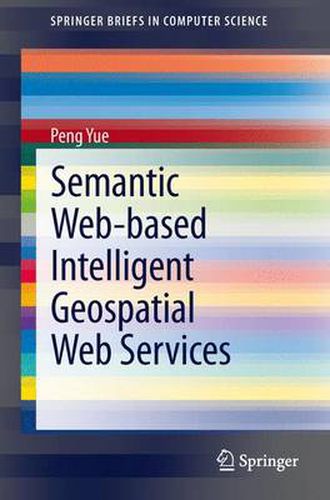Readings Newsletter
Become a Readings Member to make your shopping experience even easier.
Sign in or sign up for free!
You’re not far away from qualifying for FREE standard shipping within Australia
You’ve qualified for FREE standard shipping within Australia
The cart is loading…






This title is printed to order. This book may have been self-published. If so, we cannot guarantee the quality of the content. In the main most books will have gone through the editing process however some may not. We therefore suggest that you be aware of this before ordering this book. If in doubt check either the author or publisher’s details as we are unable to accept any returns unless they are faulty. Please contact us if you have any questions.
By introducing Semantic Web technologies into geospatial Web services, this book addresses the semantic description of geospatial data and standards-based Web services, discovery of geospatial data and services, and generation of composite services. Semantic descriptions for geospatial data, services, and geoprocessing service chains are structured, organized, and registered in geospatial catalogue services. The ontology-based approach helps to improve the recall and precision of data and services discovery. Semantics-enabled metadata tracking and satisfaction allows analysts to focus on the generation of a geospatial process model rather than spending large amounts of time in data preparation. DataType -driven service composition and path planning can help to automate a range of knowledge discovery processes in a limited geospatial domain. Process planning facilitates the construction of complex services and models for geocomputation. A three-phase procedure to cover the lifecycle of service chaining and to identify the roles of the methods involved is proposed. It includes process modeling, process model instantiation, and workflow execution. The approach is implemented in a prototype system with use cases to demonstrate applicability.
The objective of the research is to develop the key technologies for an intelligent geospatial knowledge system based on Web services to automate the data discovery and data preprocessing steps in the distributed Web service environment, to automate a range of knowledge discovery processes in a limited geospatial domain, using the automated construction and execution of service chains, and to facilitate the construction of complex services and models for geocomputation.
$9.00 standard shipping within Australia
FREE standard shipping within Australia for orders over $100.00
Express & International shipping calculated at checkout
This title is printed to order. This book may have been self-published. If so, we cannot guarantee the quality of the content. In the main most books will have gone through the editing process however some may not. We therefore suggest that you be aware of this before ordering this book. If in doubt check either the author or publisher’s details as we are unable to accept any returns unless they are faulty. Please contact us if you have any questions.
By introducing Semantic Web technologies into geospatial Web services, this book addresses the semantic description of geospatial data and standards-based Web services, discovery of geospatial data and services, and generation of composite services. Semantic descriptions for geospatial data, services, and geoprocessing service chains are structured, organized, and registered in geospatial catalogue services. The ontology-based approach helps to improve the recall and precision of data and services discovery. Semantics-enabled metadata tracking and satisfaction allows analysts to focus on the generation of a geospatial process model rather than spending large amounts of time in data preparation. DataType -driven service composition and path planning can help to automate a range of knowledge discovery processes in a limited geospatial domain. Process planning facilitates the construction of complex services and models for geocomputation. A three-phase procedure to cover the lifecycle of service chaining and to identify the roles of the methods involved is proposed. It includes process modeling, process model instantiation, and workflow execution. The approach is implemented in a prototype system with use cases to demonstrate applicability.
The objective of the research is to develop the key technologies for an intelligent geospatial knowledge system based on Web services to automate the data discovery and data preprocessing steps in the distributed Web service environment, to automate a range of knowledge discovery processes in a limited geospatial domain, using the automated construction and execution of service chains, and to facilitate the construction of complex services and models for geocomputation.